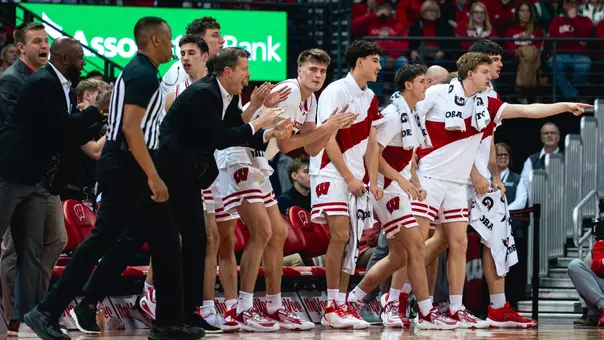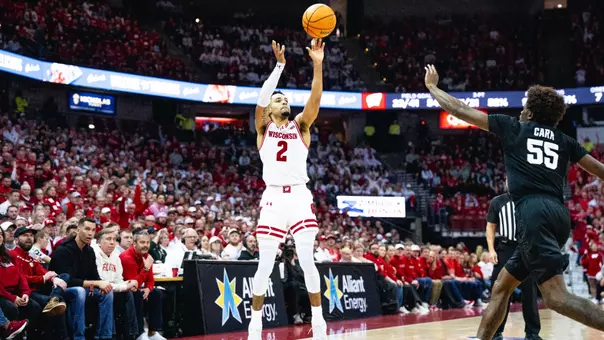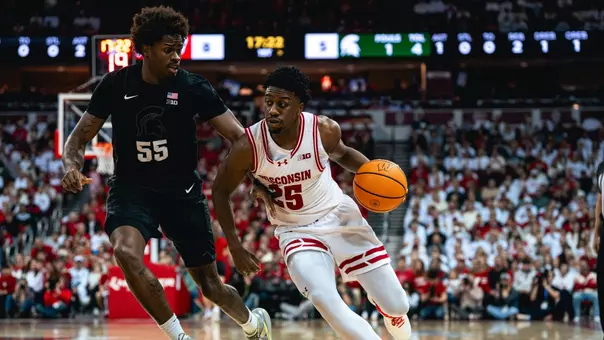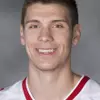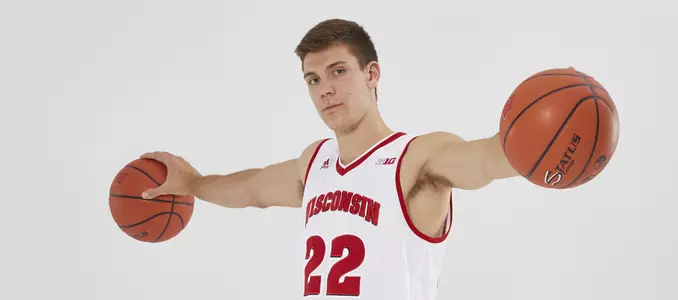
Beyond his years: Big man Happ coming up big for Badgers
January 26, 2016 | Men's Basketball, Mike Lucas
There's nothing easy about following in Frank's footsteps, but Ethan Happ is making his own name
Ethan Happ has been asked to play bigger than a 6-foot-9 forward while battling in the post in the always-physical Big Ten Conference. He's also been asked to play older than a 19-year-old redshirt freshman, being counted on for significant minutes for a Wisconsin team that's been defined by change. As evidenced by his league-high seven double-doubles, he's managed to do both — something that comes as little surprise to those that watched him develop quickly into the latest versatile Badgers big man. | From Varsity Magazine
 | ||
|
BY MIKE LUCAS
UWBadgers.com Senior Writer
The night before the Michigan State-Wisconsin game, Ethan Happ got a chance to reminisce with his former prep coach, Toby Whiteman, and his family.
"Coach Whiteman meant a lot to me," Happ said. "He was like another dad."
During Happ's conversation with his old coach, there was a passing reference to the only game that the Rockridge Rockets lost during Happ's junior season: a 56-55 defeat at the hands of Bloomington Central Catholic in the Class 2A sectional championship.
"In third quarter," Whiteman said, "Ethan pretty much put us on his shoulders."
Happ scored 10 of his game-high 29 points in the quarter, but it wasn't enough. The Rockets' 28-game winning streak came to a screeching halt. Bloomington Central went on to win the state title but it was of little consolation to Happ.
"To be honest with you," Whiteman said, "he took it hard."
The game was played nearly three years ago, and the pain hasn't gone away. Instead, it bubbled to the surface again while Whiteman and Happ were trading remembrances.
"Ethan looked at me said, 'I don't want to talk about it.' I said, 'Neither do I,'" Whiteman related. "He still has a bad taste in his mouth."
"It was the end of our undefeated season," Happ said. "We were predicted to win state that year and it still hurts to talk about it right now."
Whiteman has always known that about Happ — how things have an extended shelf life.
"If anything, he probably holds on to stuff too much," he said. "But, on the same hand, that's why he works so hard, that's what pushes him, that's why he's playing as a freshman."
His competitive drive goes well beyond what happens on a basketball court.
"If you're playing him in cards," Whiteman said, "if you're playing him in golf, if you're playing him in H-O-R-S-E, if you're playing him in a video game — in whatever — he does not like to lose."
Asked for a specific example to illustrate what he was saying, he struggled to cite just one.
"I don't necessarily know if there was one moment, one play or one thing that stands out about Ethan," said Whiteman, who paused and then blurted out, "Yeah, there was one — his junior year."
Rockridge was playing host to its rival, Monmouth-Roseville.
"I think their philosophy for that game was, 'We have 10 players and that's 50 fouls and we're going to keep fouling him,'" Whiteman recounted. "They were going to push and they were going to shove. It was the old 'Hack-a-Shaq.'
"To be honest, I really felt bad for Ethan. There were a lot of times when I would get a technical. Heck, I even got thrown out of a couple of games. I'm like, 'This is bigger than a high school game. This is a kid's livelihood. This is his career.'
"I thought they were extremely physical with him, overly physical; they double- and triple-teamed him. I remember during the game Ethan came out and said, 'Coach, it's like a war out there.'"
"I think their game plan was to see how much they could get away with, and they got away with a lot," Happ said. "That was like a preview of the Big Ten. That's what it's like every game — it's a free-for-all down there in the post."
Monmouth-Roseville beat Rockridge and Whiteman knew how Happ would respond.
"He didn't shoot free throws all that great his junior year," Whiteman said. "So what does he do? He's grabbing my keys and going to the school at 5 every morning and shooting free throws."
"He kept growing and growing and growing," Whiteman, Happ's high school coach, said. "And he just kept getting better and better and better."
Happ also realized that he had to get stronger and more physical.
"Ethan is one of those kids," Whiteman said, "who walks away from a game thinking, 'OK, that went well, but that didn't go well and that's never going to happen to me again.'"
Whiteman went out to dinner with Happ after the Badgers edged Michigan State, 77-76, on his game-winning basket with 10 seconds remaining.
"Ethan doesn't care if he scores, he doesn't care if he pulls down rebounds," Whiteman said. "The smile on his face afterwards was because of the win, not because of that basket that he made.
"That's just the type of kid that he is. All he wants to do is win."
• • • •
Happ's mailing address is Milan, Illinois, a village of a little over 5,000 near the Quad Cities.
"But he lives in a subdivision outside of Milan," Whiteman said. "There are all these little neighborhoods out in the middle of the country, nice pop-up neighborhoods."
These communities funnel their kids into Rockridge High School, grades 9-12 (enrollment: 442). Whiteman lives in Andalusia, five minutes from the school and eight miles from Milan.
"We've got kids from five or six different towns," Whiteman said. "Hardworking kids. The parents in this school district don't give their kids everything. They expect them to work for it."
That was the case in the Happ household. Randy Happ played basketball at North Central, a Division III program in Chicago. And he instilled in his sons, Eric and Ethan, that work ethic.
"Since I was little," Ethan offered, "my dad always said that I had the talent to be a Division I player. Getting in the gym and putting the time in was something I learned from him."
His older brother taught him a few things, too, during pickup games in their driveway. Usually, it was two-on-two, the Brothers Happ and a combination of the neighbors: Luke, Alex, Nile and Nolan.
"I was always the youngest one," said Ethan, two years younger than Eric, who played at Carl Sandburg College in Galesburg, Illinois. "Playing against those guys, playing up (in age), it always helped me with my toughness.
"If you shy away from contact or if you pout or anything like that, you're done playing. They're not going to let you play anymore. They were always taller and stronger and I was more of a shooter back then in the driveway games so I would try and create my own shot.
"I was actually a point guard until my sophomore year of high school.
"And that's when I hit my growth spurt."
Whiteman had heard about that spurt — how a smallish eighth grader had sprouted from 5-9 to 6-3 by the end of his freshman season.
Beyond that, Happ was just another player to Whiteman, one of the sophomores that he was inheriting after taking over as the new basketball coach at Rockridge.
"The first thing I saw was his skill set," he said. "I saw that he could handle it (the ball) and shoot it and he had passing skills and a good feel for the game for as big and long as he was."
Whiteman wanted another set of eyes to evaluate Happ. So he called one of his best friends, Chad Boudreau, an assistant coach on Rob Jeter's staff at Milwaukee.
"Chad, I've got a kid here who I think can play at the next level," Whiteman told him.
Boudreau agreed to check him out.
"Chad really liked him," Whiteman said. "It was a classic case of a kid who has those point guard skills and goes through two or three growth spurts and continues to have those skills.
"He kept growing and growing and growing. And he just kept getting better and better and better."
Milwaukee was one of the first schools to offer a scholarship to Happ.
"We offered him right after Milwaukee did," said UW assistant Howard Moore, who was then the head coach at Illinois-Chicago. "I saw him in a spring event with his AAU team (Quad City Elite).
"He was just finishing his sophomore year and I really liked his skill set and I liked his length. I know that Quad City area very well and it's a good recruiting base."
Happ never considered UIC.
"We never had a chance once Wisconsin offered," said Moore, who left Big Ten Network to assist Greg Gard in December. "At the mid-major level, you have to be honest with yourself.

"You're not going to beat the Wisconsins of the world on a kid. So you go on to the next one. At least I knew my eyes weren't deceiving me when I saw him play."
Happ averaged 15.1 points and 10.6 rebounds during his sophomore year. Two weeks after attending UW's advance camp, he verbally committed to the Badgers in late June of 2012.
"I saw him at an AAU tournament in St. Louis during the spring evaluation period in April," said UW assistant Gary Close, who was tipped off to Happ by a friend, Rock Island coach Tom Sigel.
"Tom called and said, 'Here's a perfect guy for the way you play — you should check him out,'" Close recalled of their conversation. "And he was right. He was very active. He looked like he enjoyed playing. And, obviously, he had some natural talent and ability."
Happ showed promise in other sports. In football, he was a quarterback and wide receiver through the eighth grade. After giving up baseball for a year to focus on basketball, he went back out as a senior. His first cousin is J.A. Happ, 33, a veteran Major League pitcher.
During the offseason, Happ signed a three-year, $36 million free agent contract with the Toronto Blue Jays. The cousins have been known to exchange tests congratulating each other.
"Ethan could have played a lot of sports," Whiteman said. "He came up to me before his senior year and says, 'I'm thinking about playing football.'"
Whiteman, also a football assistant, was startled and advised him, "Guys are taking shots at you during the basketball season, what do you think they're going to do in football?'"
• • • •
His USA select jerseys are hanging in his closet at home.
"They're a good reminder," Happ said.
A good reminder of how much fun he had and what he accomplished in the 2014 Albert Schweitzer Tournament, an Under-18 mini-World Cup for basketball, and an unofficial world championship involving teams from 16 countries. The games are staged every two years in Mannheim, Germany.
Close was the conduit for Happ. One of his friends, Mike Olson, a prep school coach in New Hampshire, was in charge of the select team. Olson contacted Close and inquired if he knew of any players that might be interested in competing against the best in the world. Close recommended Happ.
"That week in Germany," Happ said, "was definitely one of the best times in my life."
Happ was reminded of that experience during Wisconsin's road trip to Penn State. Happ got a text from Mike Leazier, one of Olson's assistant coaches with the U.S. team. Leazier is now living in State College where his wife is the head of the philosophy department on campus.
Last Thursday afternoon, Leazier met Happ at the team hotel. They chatted in the lobby for about 30 minutes.
"It was such an interesting trip (to Germany)," Leazier said. "We met these players in the airport at JFK, flew overnight, landed, checked into the hotel and went to practice. We were just trying to put a group of guys together quickly, two days removed from our first game.
"One of the things that stood out right away was that Ethan was so athletic around the rim, a great finisher; he could really run the floor and he was an active defender around the basket.
"He quickly emerged in the minds of a lot of us on the coaching staff as what looked like our best player. That was our first impression. As we started playing games that was substantiated."
During the seven-game tournament, Happ averaged 19.1 points, 10.7 rebounds, 3.4 steals and 1.9 blocks. The select team opened with a win over Italy in the qualification round and then defeated Chile, France, the Ukraine, defending champ Spain and Serbia to reach the championship game.
It was the first time that the United States had made the final since 1996. Happ led the way with 29 points, 13 rebounds and seven steals against Serbia in the semis. Despite 20 points and 11 rebounds from Happ, Italy avenged its earlier loss by beating the Americans, 86-73, for the gold medal.
Nonetheless, Happ was honored as the Most Valuable Player of the Schweitzer Tournament; the first U.S. player to be MVP since 2000. Magic Johnson, Kyle Lowry, Paul Gasol, Kevin Garnett, Tim Duncan and Dirk Nowitzki are among the many Schweitzer alums.
"The United States is the one team in the tournament that is not sponsored by the country's federation," Leazier said. "It's a select team put together by a group of coaches that are basically volunteering to do it. The opponents were national teams that had been together for a number of years.
"It speaks absolute volumes to be the MVP of that tournament … it was unique for him because he was in an environment where he felt like he had to prove himself and earn his minutes whereas he was coming from a high school environment where he was the star."
Upon returning to the states, Leazier said all of the U.S. coaches agreed on one thing: "This kid is going to be really good at Wisconsin. I don't think it has surprised any of us to see his productivity. But it has certainly brought a smile to our faces, that's for sure."
Happ still stays in touch with some of his Schweitzer teammates, including Northwestern's Scottie Lindsey and Rutgers' Mike Williams. He also made friends with some Argentina players. They communicate via Twitter and Facebook. He holds those relationships dear to his heart.
"Those were some of the best players in the world at my age," Happ said. "And to play well against them, it gave me a boost going into my freshman year (at Wisconsin). Even though I ended up redshirting, I still really cherish having gone to Germany."
Leazier watched Happ produce his seventh double-double (20 points and 11 rebounds) of the season last Thursday night in Wisconsin's 66-60 victory over Penn State. Earlier in the day, Leazier pointed out, "He doesn't shy away from competitive challenges. He wants to do well, he wants to play."
Big Ten Network analyst Shon Morris has observed many of the same qualities.
"He's really good around the basket and when he gets a little bit more consistent with that 12- to 15-foot jump shot, he's going to be difficult to defend," said the 6-10 Morris, a four-year letterwinner and 1,000-point scorer at Northwestern.
"You can tell that he has spent a lot of time working on his footwork. It just goes to show you what it can mean to big guys having that extra year (as a redshirt) — like he did going against (Frank) Kaminsky — and taking their beatings, just like Frank did from Jared Berggren.
"It's almost like a puzzle," Happ said. "You have to try and figure out what you can do better than the other guy in order for you to win your matchup."
"To have that happen in practice before the lights come on really gives you a chance to come in when the redshirt comes off and play. And he's showing that. He's definitely going to be a member of my all-freshman team this year and down the road, I see him as an All-Big Ten player."
Morris praised Happ for beating guys to spots on the floor and understanding angles and the patience that it takes to move a defender up and down the lane. "He's as advanced as anyone I've seen over the last five or six years of understanding that," he said.
Some of Happ's footwork can be traced to his early training as a point guard.
Some of his familiarity with angles can be credited to Kaminsky, the reigning national player of the year.
"Frank definitely schooled me on it a lot of times," he said. "When you talk about angles, you talk about the pivot foot. If one way is shut off, you can still pivot and go back the other way. Patience and pivoting is what I think of when I think of angles.
"A lot of people think it's about who's bigger, who's stronger. I've gone against a lot of people who are bigger and stronger than me. It's almost like a puzzle. You have to try and figure out what you can do better than the other guy in order for you to win your matchup."
Happ has studied clips of former Creighton star Doug McDermott, now with the Chicago Bulls.
"I've watched a lot of him in the post — that's where he got a lot of his points (in college)," Happ said. "Once he caught the ball and read the defense, he made a quick, decisive move. A lot of times he did his work before he caught the ball, and that's something I need to improve on as well."
McDermott could stretch a defense with his jumper. Happ hasn't refined one yet.
"But next year," he said, "I see myself being able to play on the perimeter a little more."
Close believes that Happ's range will improve in time to where he can face up and score.
"He's got a chance to make a jump similar to what Nigel (Hayes) did when he didn't shoot a 3-pointer his entire freshman year," Close said, "It's more of a confidence factor than anything else."
Close brought something else up.
"This is a tough league," he said, "and you have to keep telling yourself that he's a freshman even though he has been around here for a couple of years. He's doing this for the first time.
"So there are going to be some ups-and-downs."
The 19-year-old Happ can be tough on himself. Emotionally, he's an open book.
"You don't want to squelch it too much," Close said. "That's part of what makes him good."
When Leazier asked how he was handling everything as a starter, Happ conceded, "I used the 'up-and-down' term a lot, and it has been an up-and-down season — for myself and the team."
When pressed for more clarity, Happ explained, "There have been times where I've felt really good about what we're doing. And, then, there are times where I've been disappointed in myself for not playing up to what I should be doing.
"It's different in college because it's not all on my shoulders like it was in high school or even in Germany. It's not up to me entirely whether we win or lose, not that it was ever entirely. But I had a lot more say in it than I do now. I'm just a piece to the puzzle."
A pretty big one at that. And he's figuring out how he fits.

